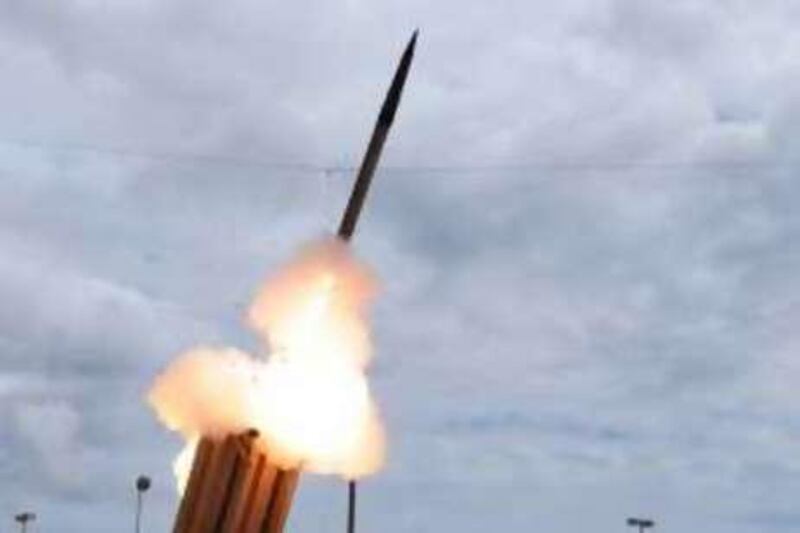The UAE is approaching a milestone in its plans to purchase the Terminal High Altitude Area Defence (THAAD) missile system for an estimated US$7 billion (Dh25.71bn) from the US, according to officials from the American defence company Lockheed Martin. A sale would mark the first time the THAAD system has been exported by the US and underscore the deep ties forming between America and the Emirates.
The UAE could receive a "letter of agreement" from the US government later this summer after the two administrations made progress on their negotiations over the sensitive technology, said Dennis Cavin, the vice president of air and missile defence strategic initiatives at Lockheed. "The UAE and the US have made solid strides in these last few months," Mr Cavin said. "We could expect that in the next three months the UAE would receive its letter of agreement."
Although some observers have forecast that the multibillion-dollar sale could go through this year or next, Mr Cavin declined to comment, saying the matter was between the two governments. THAAD missiles carry no warhead but instead rely on the kinetic energy of impact to take out targets at altitudes of up to 150km. The system would create another layer of protection for the Emirates beyond its plans to develop a Patriot-based missile shield.
The US Defence Security Co-operation Agency (DSCA) has said the UAE could acquire three THAAD "fire units" equipped with a total of 147 anti-ballistic missiles, four radar sets, six fire and control communication stations and nine launchers. In September 2008, the agency said: "This proposed sale will contribute to the foreign policy and national security of the United States by helping to improve the security of a friendly country that has been and continues to be an important force for political stability and economic progress in the Middle East."
The deal is being structured as a foreign military sale, meaning the UAE will purchase the equipment from the US government directly rather than Lockheed, which is the principal defence contractor developing the programme. Raytheon is also a major partner in the proposed deal, contributing the radar component. According to the DSCA, the US approval letter is a government-to-government agreement that identifies the defence articles and services that the US government proposes and also spells out the terms and conditions that will apply.
The THAAD system is still in development and will undergo its 14th test flight above Kauai island in Hawaii next month. Air and missile defence is a growing focus for Gulf nations and the US as they seek to find ways of collaborating and matching up their various missile defence programmes, which include the Hawk, Patriot, Aegis and THAAD systems. Themes such as "burden sharing" have been growing among the Gulf nations to provide their own defences, as well as integration.
Experts meeting at a conference in Abu Dhabi this week stressed that without integrating the various missile defence systems throughout the GCC, any incoming threat could be met with an inappropriate or insufficient response. According to the US congressional research service, Gulf states purchased $88bn worth of arms between 1988 and 2007. Last year, the UAE became the fourth-largest arms importer in the world, according to the Stockholm International Peace Research Institute.
igale@thenational.ae






